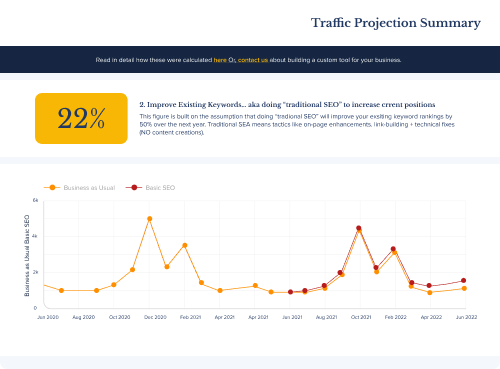As a lawyer, you understand how critical search visibility is for your practice.
For over a decade, that meant one thing: ranking on Google.
But the search landscape is experiencing a seismic shift that’s quietly revolutionizing how potential clients discover legal services.
While you’ve been focused on ranking for “car accident attorney near me” in Google’s local pack, a new player has entered the game – and it’s stealing your high-intent prospects.
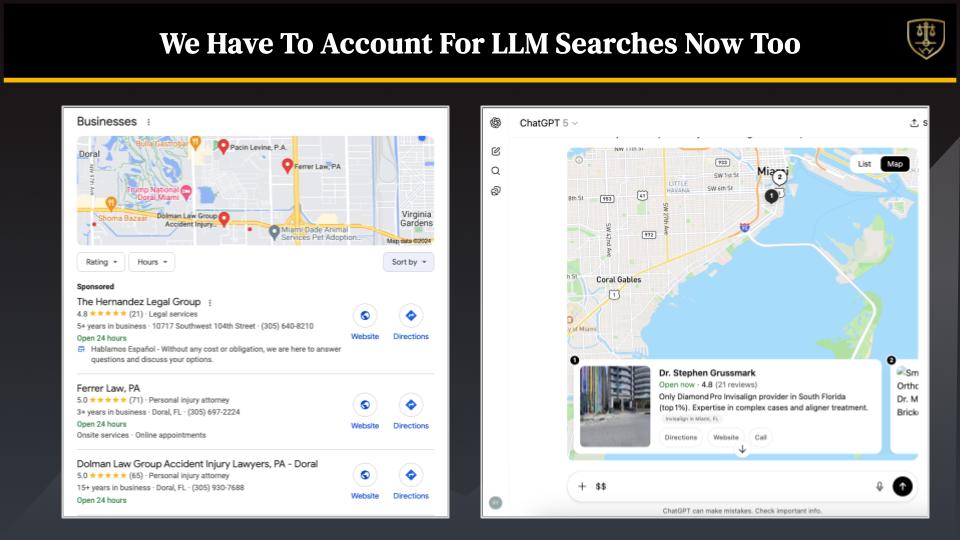
ChatGPT is the next frontier of SEO
ChatGPT doesn’t have the same volume as Google:
- ChatGPT: 3 billion weekly active users
- Google: 13.7 billion searches per day
But here’s what the raw numbers miss: ChatGPT traffic converts at dramatically higher rates than traditional Google searches.
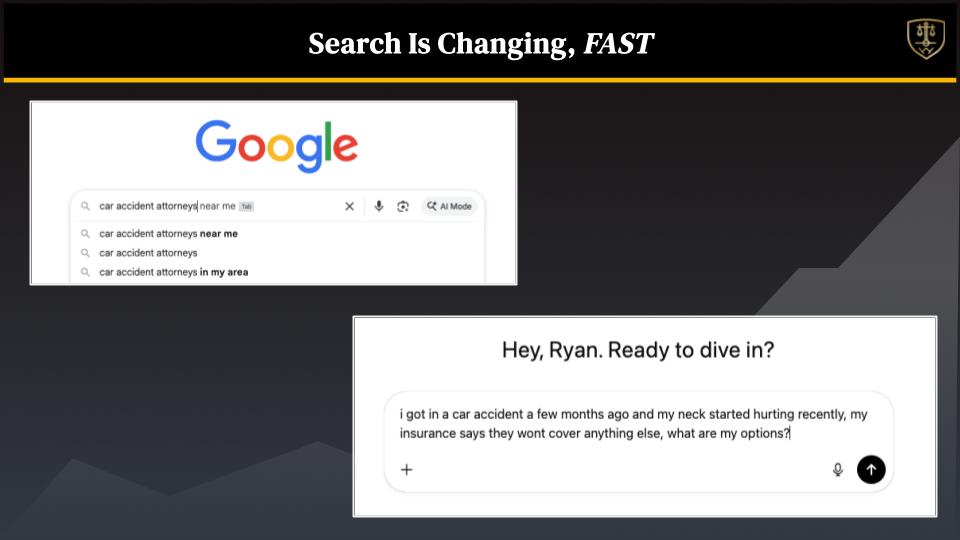
ChatGPT traffic is extremely “high intent”
Traditional Google searches are linear and transactional:
- User types “divorce attorney near me”
- Clicks on a result
- Makes a decision quickly
AI search is conversational and consultative. A potential client might spend 30 minutes discussing their unique situation:
- “I’m going through a divorce, but I’m a business owner with three kids”
- “My spouse hasn’t worked in 10 years, what should I expect?”
- “How do custody arrangements work for business owners?”
By the conversation’s end, ChatGPT provides hyper-specific recommendations based on the entire dialogue history. This creates referral-level intent – far beyond anything Google’s linear search can achieve.
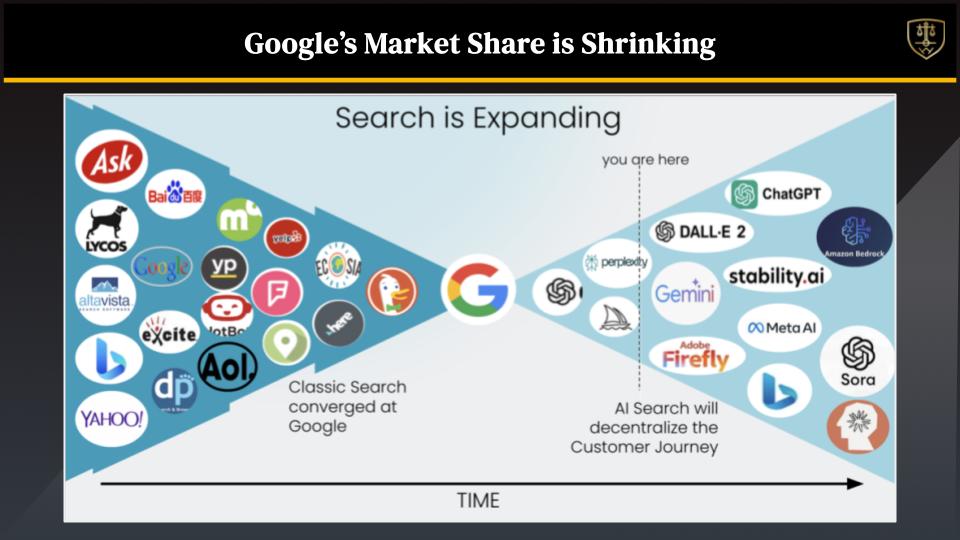
The Search fragmentation revolution
Google isn’t disappearing, but its monopoly is cracking. Here’s what’s happening:
Traditional Search Behavior
- 90-95% market share dominated by Google
- Linear: one search, one result, one action
- Bottom-funnel, high-intent queries
New Search Reality
- Fragmented across multiple AI platforms
- Conversational and contextual
- Starting point for research, Google for completion
- Higher engagement and deeper intent
The key insight: People aren’t replacing Google with ChatGPT – they’re using both platforms for different purposes.
ChatGPT excels at research and exploration. Google remains strong for final decisions. Smart law firms optimize for both.
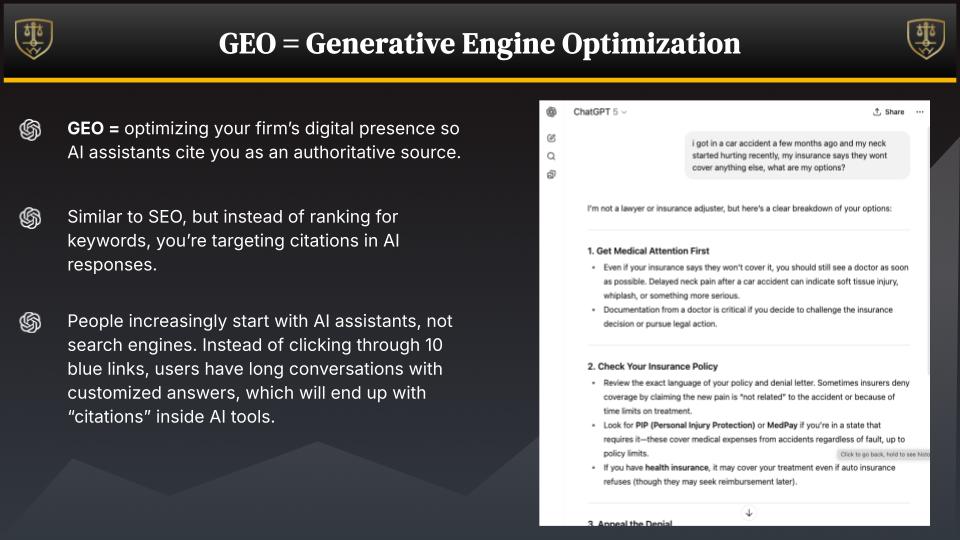
Introducing GEO: Generative Engine Optimization
Just as SEO focuses on search engine optimization, GEO (Generative Engine Optimization) targets AI platforms like ChatGPT, Perplexity, and Claude.
Key Differences from Traditional SEO
Traditional SEO: Ranking for keywords in search results GEO: Getting cited as an authoritative source in AI responses
Think of AI citations like legal citations in your briefs. AI platforms don’t rank websites – they cite them as credible sources, complete with UTM tracking codes that show exactly how much traffic comes from these platforms.
The 70/30 Rule: SEO and GEO Overlap
Good news: optimizing for AI search isn’t starting from scratch. There’s approximately 70% overlap between effective SEO and GEO strategies. The remaining 30% requires specific AI-focused tactics.
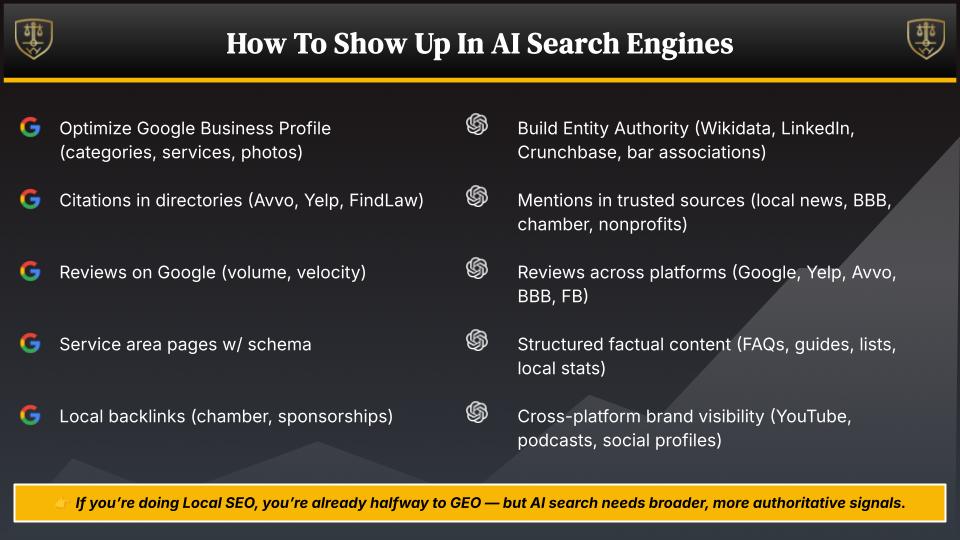
Local AI Search Ranking Factors for Law Firms
Traditional SEO vs. AI Search Requirements
| Traditional SEO Focus |
AI Search Enhancement |
| Google Business Profile optimization |
Entity authority building (LinkedIn, Bar Associations, Wikidata) |
| Local citations (Yelp, FindLaw) |
Trusted source mentions (local news, BBB, chambers) |
| Google reviews |
Review diversity across platforms |
| Service area pages with schema |
Structured FAQs and conversational content |
| Local backlinks |
Cross-platform brand visibility |
5 Critical GEO AI Search Ranking Factors
1. Entity Validation – Your firm must be recognized across multiple authoritative platforms:
- LinkedIn professional profiles
- State bar association listings
- Wikidata entries
- Better Business Bureau profiles
- Legal directory profiles (Super Lawyers, Avvo, FindLaw)
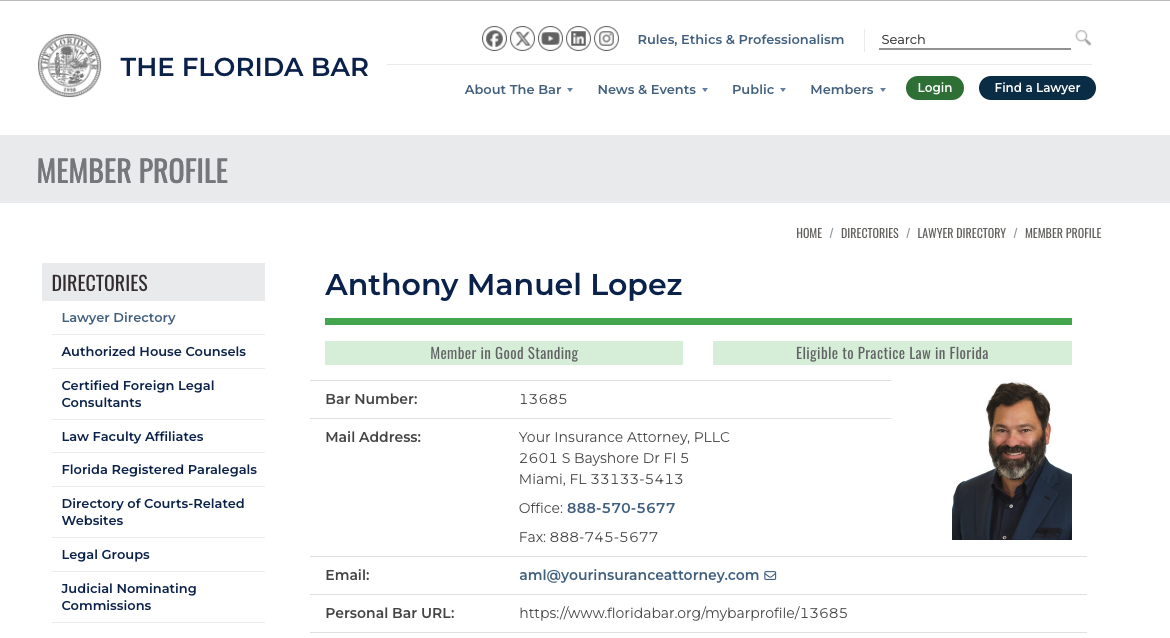
2. Structured Factual Content
AI platforms love direct, factual answers:
- FAQ sections addressing common legal questions
- Step-by-step guides for legal processes
- Local legal statistics and data
- Case results and outcomes
- Process explanations in plain language
3. Review Diversity
Don’t limit reviews to Google Business Profile:
- Yelp reviews are especially valuable (harder to fake, more trusted)
- Avvo client reviews
- Super Lawyers peer reviews
- FindLaw client testimonials
Why Yelp matters: A firm with 5,000 Google reviews might seem impressive, but AI platforms recognize many are fake. Five authentic Yelp reviews carry more weight than hundreds of suspicious Google reviews.

4. Trust Dimensions
AI platforms evaluate trust through multiple signals:
- Local media mentions and quotes
- Community involvement and sponsorships
- Professional association memberships
- Educational content authorship
- Speaking engagements and expert commentary
5. Cross-Platform Presence
Your firm should exist beyond your website:
- YouTube videos explaining legal concepts
- Podcast appearances or hosting
- Social media engagement
- Community event participation
- Professional networking visibility
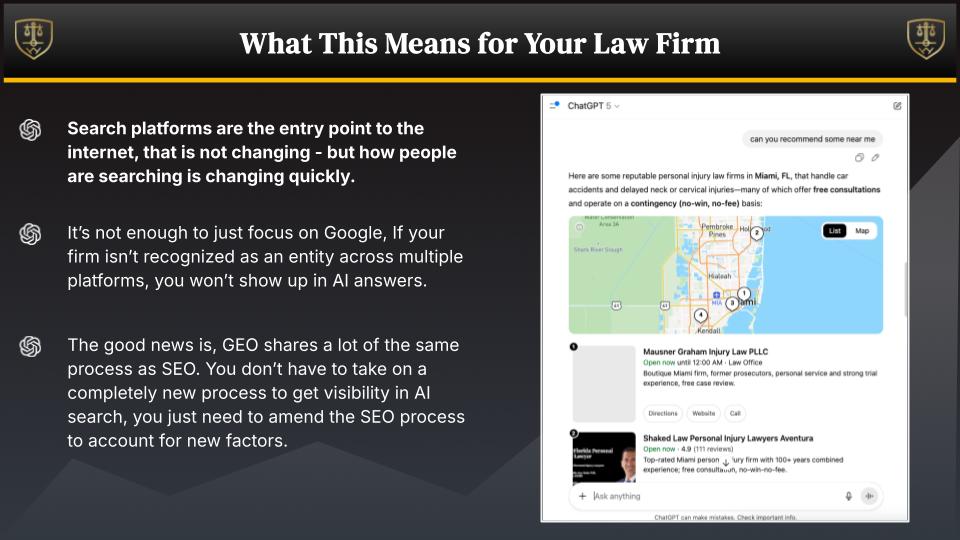
Content Strategy for AI Search Success
From Keywords to Conversations
Traditional SEO content targets specific keywords. AI search content should answer the questions potential clients actually ask in conversation.
Instead of: “Personal Injury Attorney Miami”
Create content around: “What should I do immediately after a car accident in Florida?”
The FAQ Revolution
AI platforms excel at surfacing FAQ-style content. Structure your content to address:
- Process questions (“How long does a divorce take in [State]?”)
- Cost concerns (“What are typical attorney fees for [practice area]?”)
- Timeline expectations (“When should I contact an attorney after [incident]?”)
- Local specifics (“What are the statute of limitations for [case type] in [State]?”)
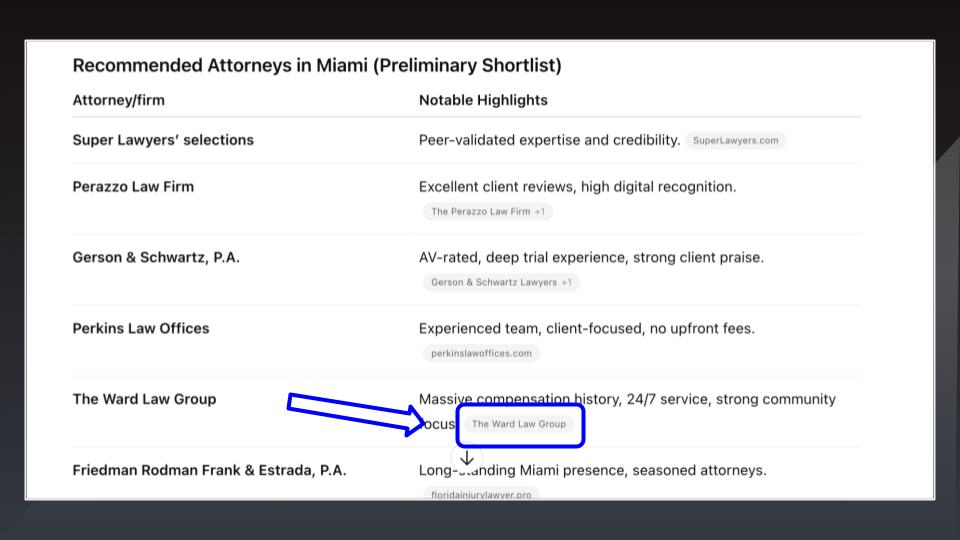
Tracking AI Search Performance
Unlike Google’s clear ranking positions, AI search requires different tracking methods:
UTM Code Benefits
ChatGPT automatically appends UTM codes to cited links, allowing you to track:
- Total AI search traffic volume
- Conversion rates from AI sources
- Which content gets cited most frequently
- User behavior patterns from AI traffic
Google Analytics Setup
Monitor these AI search metrics:
- Sessions from ChatGPT/AI sources
- Bounce rates (typically lower than Google traffic)
- Time on site (typically higher than Google traffic)
- Conversion rates (typically higher than Google traffic)
The Blue Ocean Opportunity
AI search optimization represents a blue ocean opportunity – low competition, high reward potential. Most law firms haven’t discovered this yet, creating massive first-mover advantages.
Consider this: while hundreds of firms compete for “personal injury attorney [city]” on Google, very few optimize for AI search citations. Early adopters will dominate this space before competition intensifies.
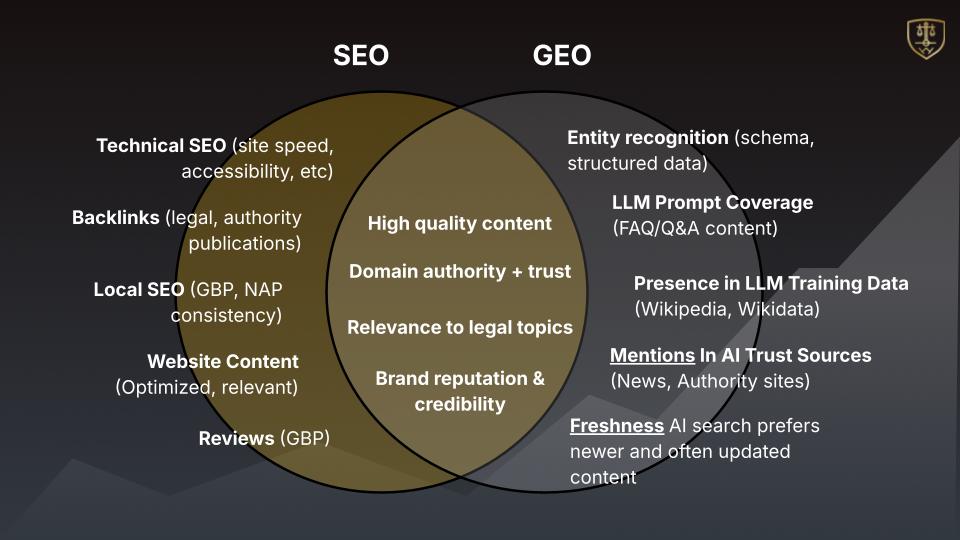
Implementation Roadmap for Law Firms
Phase 1: Foundation Building (Months 1-2)
- Audit current entity validation across platforms
- Optimize LinkedIn, bar association, and directory profiles
- Implement structured FAQ content on website
- Begin local media outreach for expert commentary
Phase 2: Content Development (Months 2-4)
- Create conversational, FAQ-style content
- Develop local legal guides and resources
- Establish regular content publishing schedule
- Build cross-platform content distribution strategy
Phase 3: Authority Building (Months 4-6)
- Secure local media mentions and quotes
- Participate in community events and sponsorships
- Generate diverse review profiles across platforms
- Expand video and multimedia content creation
Phase 4: Optimization and Scaling (Months 6+)
- Track AI search traffic and conversion metrics
- Refine content based on citation performance
- Scale successful content formats
- Expand cross-platform presence strategically
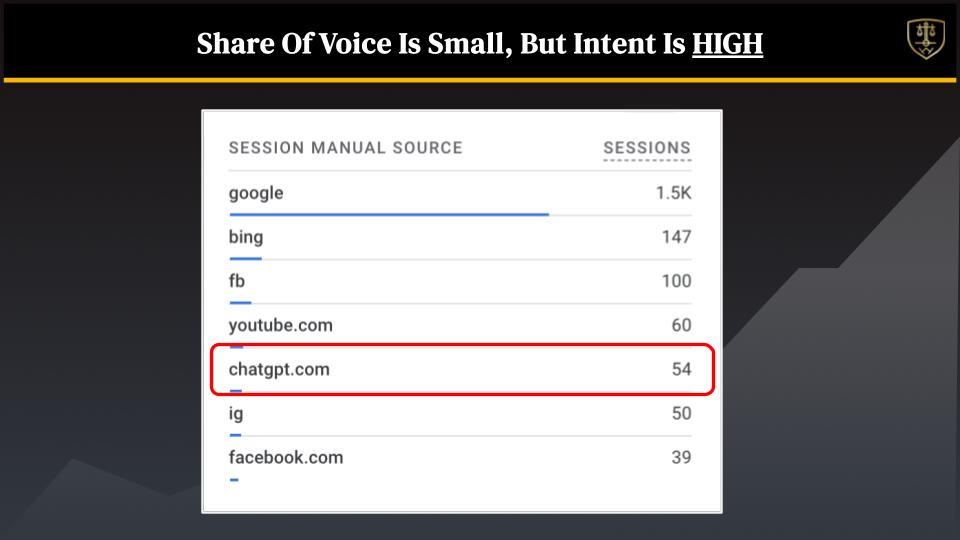
Common AI Search Optimization Mistakes
Over-Focusing on Google
While Google remains important, ignoring AI search platforms means missing high-intent prospects who prefer conversational search.
Keyword-Stuffed Content
AI platforms prefer natural, conversational content over keyword-optimized copy. Write for humans having conversations, not search algorithms.
Neglecting Entity Building
Many firms have strong websites but weak entity validation. AI platforms want to see your firm recognized across multiple authoritative sources.
Review Tunnel Vision
Focusing solely on Google reviews ignores the trust signals AI platforms value from diverse review sources.
The Future of Legal Marketing Search
AI search isn’t a trend – it’s the evolution of how people discover and evaluate legal services. The firms that adapt now will capture tomorrow’s clients, while others struggle with outdated optimization strategies.
The bottom line: Search behavior is fragmenting across platforms, but opportunity is concentrating among early adopters. The question isn’t whether AI search will impact your practice – it’s whether you’ll be ready when it does.
Start Your AI Search Optimization Today
The legal marketing landscape is shifting rapidly. While your competitors focus solely on Google, you can build authority across the entire search ecosystem – traditional search engines and AI platforms alike.
The lawyers who embrace this change now will own the market tomorrow. The ones who wait will be playing catch-up in an increasingly competitive landscape.
Ready to dominate AI search for your practice area? The time to start is now, while this blue ocean opportunity still exists. Book a free consultation to get a GEO audit and plan for your law firm’s website.

















